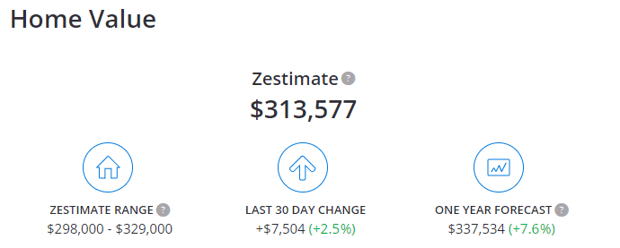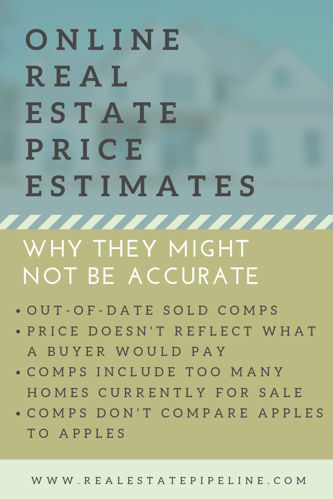Your clients are ready to sell their home so you create a CMA to let them know what their house is worth. Your client may balk when they see the suggested list price, determined to list for more based on an estimate they saw online. Let's explore computer-generated home pricing so you can help your clients understand why online pricing might not be in their favor.
When a homeowner is thinking about selling their home, they will likely go online to get an idea of how much their house is worth. Some online estimates can be very misleading, leaving the homeowner to believe they can get more money from the sale of their home than is realistic. That's where you, the real estate expert, come in. You can shed light on online price estimates and set a much more realistic list price which will sell the house at a price buyers are willing to pay.
Algorithms
Price-estimating website algorithms may use a zip code to compare houses or even compare houses which share the same square footage. You can imagine how this leads to inaccurate pricing. One zip code can have affluent areas and less-than-appealing areas, leading to unreliable price comparisons. When it comes to square footage, the same theory applies. Just because 2 homes have similar square footage, if one is run down and the other is updated, they will list for vastly different prices.
In addition, algorithms aren’t going to take into consideration specifics about the house that only a homeowner or real estate agent would know. An algorithm isn't going to calculate exceptional views into the price, yet that could increase the value of a home. It isn’t going to have the market knowledge that you, the real estate expert, has either. Use these points to your advantage to help your clients understand why your pricing is more exact than online estimates.
Home Value Ranges
Just because an online estimate says a home is worth between $298,000 - $329,000, it doesn't mean that listing at $329,000 will sell the house. If buyers aren't willing to pay that much, your client's house will sit on the market longer than it should or it might not sell at all. Explain to the seller that the computer-generated price is simply a starting point and not necessarily the ideal selling price.

Educate your clients on the best way to determine a fair list price using sold comps. Explain the purpose of comparing your client's home to similar, neighboring homes which have sold in the past 3 months. Online estimates might include recently sold homes but look at those dates closely with your clients -- they may have sold more than a year ago.
 Let clients know that your comps will also include homes currently for sale, if you don’t have enough sold data. Then, point out houses online that are overpriced because their comps include too many homes currently on the market and not enough recently sold homes. Your clients need to know that these homes, which are currently for sale, may not sell for list price. They may sell for much less which, once again, contributes to unrealistic price estimates.
Let clients know that your comps will also include homes currently for sale, if you don’t have enough sold data. Then, point out houses online that are overpriced because their comps include too many homes currently on the market and not enough recently sold homes. Your clients need to know that these homes, which are currently for sale, may not sell for list price. They may sell for much less which, once again, contributes to unrealistic price estimates.
Another factor to be aware of is when websites compare your client’s home with homes that have different features. For example, comparing a 2 bd/ 2 ba/ 1250sf home to a 4 bd/ 3.5 ba/ 2400sf isn't helpful in determining a fair list price. Look closely at online comps to see if your client's house is being compared to homes of similar size. Your knowledge of the neighborhood can shed light on discrepancies and convince your clients that your pricing is the most accurate.
Remodels/Upgrades
There's no denying that an updated home brings more money than an outdated home but if there's no record of a recent remodel, websites won't be able to calculate it into the overall value. A good example of this is an unpermitted kitchen remodel -- the upgrade won't be reflected in the online price because the remodeling project was never filed with the city or local tax assessor. Help your client navigate how upgrades can affect the price of their home, why the internet may exclude them, and how the upgrade can be used to their advantage or against it (ex. no proof kitchen plumbing is up to code).
Appraisal Value
Setting the list price high, to reflect a computer-generated price, may lead to issues for the seller and buyer when the house gets appraised. The buyer's mortgage lender will require a home appraisal, and if it comes in lower than the list price, the buyer may have to find a way to pay for the difference or the seller may have to reduce the price. In some cases, the potential buyer may terminate the transaction, if there is a financing contingency. Help your clients grasp this notion before they list their house.
Conclusion
When it comes to computer-generated home prices, help your clients understand that online estimates are not always the best indicator of a home’s value. Be proactive by researching online estimates before meeting with clients, then share your real estate expertise -- strong comps, neighborhood knowledge, ability to navigate complex transactions. With your help, clients will be convinced that your pricing will sell their home at the right price and in a reasonable amount of time.

 By
By 